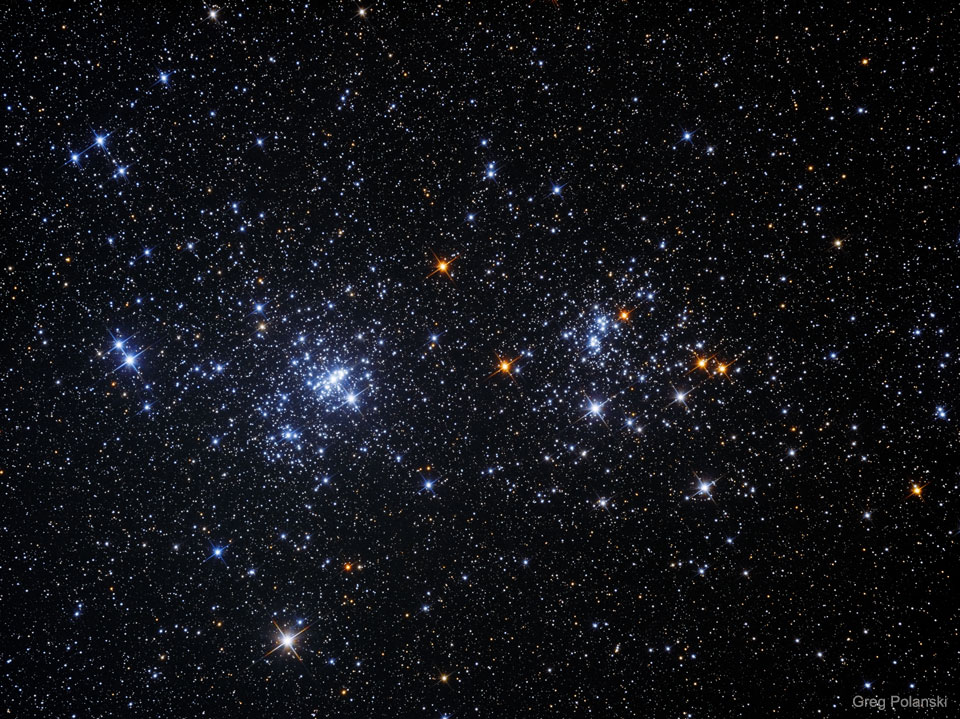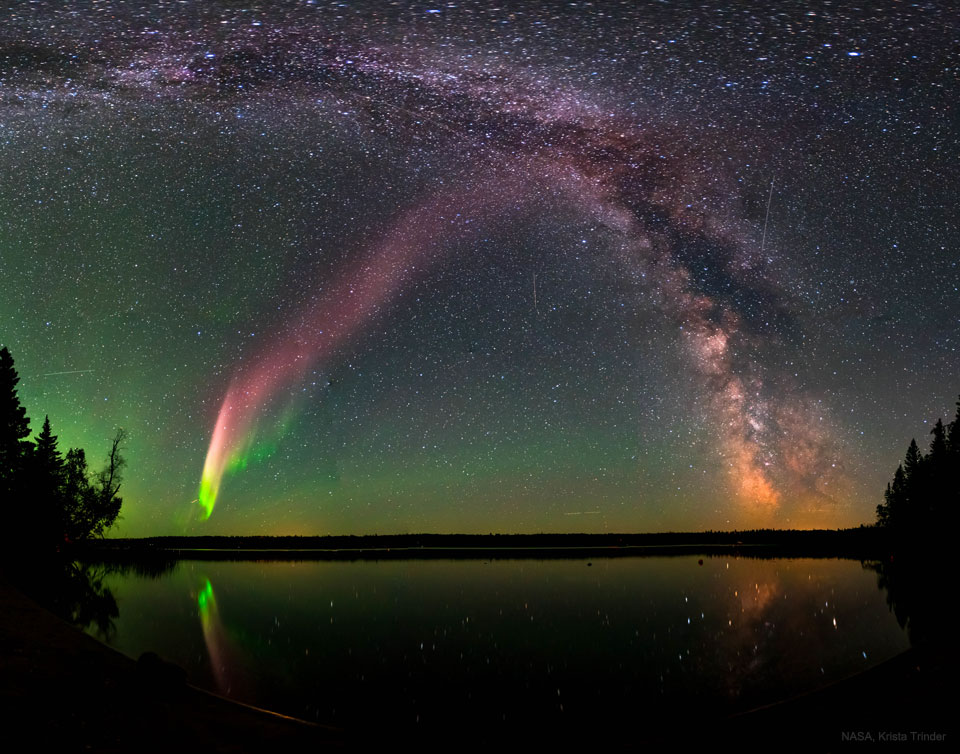Blog
This stunning image from Hubble shows the majestic galaxy NGC 1015, found nestled within the constellation of Cetus (The Whale) 118 million light-years from Earth. In this image, we see NGC 1015 face-on, with its beautifully symmetrical swirling arms and bright central bulge creating a scene akin to a sparkling Catherine wheel firework. NGC 1015 has a bright, fairly large centre and smooth, tightly wound spiral arms and a central “bar” of gas and stars. This shape leads NGC 1015 to be classified as a barred spiral galaxy — just like our home, the Milky Way. Bars are found in around two-thirds of all spiral galaxies, and the arms of this galaxy swirl outwards from a pale yellow ring encircling the bar itself. Scientists believe that any hungry black holes lurking at the centre of barred spirals funnel gas and energy from the outer arms into the core via these glowing bars, feeding the black hole, fueling star birth at the centre and building up the galaxy’s central bulge. In 2009, a Type Ia supernova named SN 2009ig was spotted in NGC 1015 — one of the bright dots to the upper right of the galaxy’s centre. These types of supernovae are extremely important: they are all caused by exploding white dwarfs which have companion stars, and always peak at the same brightness — 5 billion times brighter than the Sun. Knowing the true brightness of these events, and comparing this with their apparent brightness, gives astronomers a unique chance to measure distances in the Universe.

November 19th 1980
As a musical director, George Freeman is well versed in selecting players, communicating concepts and orchestrating powerful shows. His solo full-length debut, Make It Happen, reveals a musical crossroads of jazz, pop, R&B, gospel and neo-soul. Slow burning grooves underscore supple melodies, articulate arpeggios and dynamic keyboard dexterity as the keyboardist, producer and bandleader who plays behind a celebrated roster of musical luminaries steps into the spotlight to showcase his own artistry.
Songs from Make It Happen, like “Tengo Un Amor”, “Two Step” and others currently play on both national and international jazz radio and internet stations. In 2015, George’s first single release from the album “Night Lights” placed 26th on the Billboard Smooth Jazz National Airplay Chart, and stayed on the chart for nine weeks. Making his home in the North Carolina town of Fayetteville, George is a prime player in a vital creative community that includes saxophonist Jeanette Harris who is featured on a reinterpretation of the Anita Baker hit “Sweet Love” included on Make It Happen. “I look for people who are open minded; who aren’t locked into one thing,” George says. “Talent and capability, that goes without saying, but I enjoy good spirited people who are easy to work with.” Born to a musical family, George says that singing in church was a key factor in his education.
more...Kenny Werner (born November 19, 1951) is an American jazz pianist, composer, and author. Born in Brooklyn, New York, on November 19, 1951 and then growing up in Oceanside, Long Island, Werner began playing and performing at a young age, first recording on television at the age of 11. Although he studied classical piano as a child, he enjoyed playing anything he heard on the radio and improvisation was his true calling. In high school and his first years of college he attended the Manhattan School of Music as a classical piano major.
His aptitude for improvisation led him to the Berklee College of Music in 1970, where he met and studied with his first piano/spiritual teacher, Madame Chaloff. From Boston, Werner traveled to Brazil with the saxophonist Victor Assis Brasil. There he met Assis’s twin brother, Brazilian pianist Joao Assis Brasil. His studies with Joao and Madame Chaloff would lead to the writing of the book Effortless Mastery.
more...Joseph Edward Hunter (November 19, 1927 – February 2, 2007) was an American musician and keyboardist, known for his recording session work with Motown Records‘ in-house studio band, the Funk Brothers. One of the original Funk Brothers, Hunter served as band director for the band from 1959 until 1964, when he left Motown and was replaced by Earl Van Dyke.
Hunter was born in Jackson, Tennessee, United States. Though his time with the Funk Brothers was short, his keyboard playing was integral to the “Motown Sound” . Hunter left a lasting impression on future Motown session musicians, and artists such as Stevie Wonder.[citation needed] He also produced and arranged various soul tracks during the 1960s. He was involved with Pied Piper Productions. Some artists that Hunter can be affiliated with are Dennis Edwards, The Hesitations, Freddy Butler and John Lee Hooker.
Hunter’s influences include Art Tatum, Sergei Rachmaninov, and Nat King Cole. Among the many records he played piano on are “Shop Around” by The Miracles (though the Gerald Posner book, Motown, credited Berry Gordy, Jr), “Do You Love Me” by The Contours, “Pride and Joy” by Marvin Gaye, and “Heat Wave” and “Come and Get These Memories” by Martha & the Vandellas.
Joe Hunter died of natural causes on February 2, 2007, at the age of 79. He was a full-time musician in the Detroit area at the time of his death. He is survived by his son Joe jr, daughter Michelle, and three grand children Joe III, Nathan and Isaac.
more...Thomas Francis Dorsey Jr. (November 19, 1905 – November 26, 1956 Mahanoy Plane, PA) was an American jazz trombonist, composer, conductor and bandleader of the big band era. He was known as the “Sentimental Gentleman of Swing” because of his smooth-toned trombone playing. His theme song was “I’m Getting Sentimental Over You“. His technical skill on the trombone gave him renown among other musicians. He was the younger brother of bandleader Jimmy Dorsey. After Dorsey broke with his brother in the mid-1930s, he led an extremely popular and highly successful band from the late 1930s into the 1950s. He is best remembered for standards such as “Opus One“, “Song of India“, “Marie”, “On Treasure Island”, and his biggest hit single, “I’ll Never Smile Again“.
more...Hank Ballard (born John Henry Kendricks; November 18, 1927 – March 2, 2003 Detroit) was a rhythm and blues singer and songwriter, the lead vocalist of The Midnighters and one of the first rock and roll artists to emerge in the early 1950s. He played an integral part in the development of the genre, releasing the hit singles “Work With Me, Annie” and answer songs “Annie Had a Baby” and “Annie’s Aunt Fannie” with his Midnighters. He later wrote and originally recorded (in 1959) “The Twist” which was notably covered a year later by Chubby Checker, this second version spreading the popularity of the dance. He was inducted into the Rock and Roll Hall of Fame in 1990.
more...Most star clusters are singularly impressive. Open clusters NGC 869 and NGC 884, however, could be considered doubly impressive. Also known as “h and chi Persei”, this unusual double cluster, shown above, is bright enough to be seen from a dark location without even binoculars. Although their discovery surely predates recorded history, the Greek astronomer Hipparchus notably cataloged the double cluster. The clusters are over 7,000 light years distant toward the constellation of Perseus, but are separated by only hundreds of light years. In addition to being physically close together, the clusters’ ages based on their individual stars are similar – evidence that both clusters were likely a product of the same star-forming region.

Cindy Blackman Santana (born November 18, 1959), sometimes known as Cindy Blackman, is an American jazz and rock drummer. Blackman has recorded several jazz albums as a bandleader and has performed with Pharoah Sanders, Sonny Simmons, Ron Carter, Sam Rivers, Cassandra Wilson, Angela Bofill, Buckethead, Bill Laswell, Lenny Kravitz, Joe Henderson and Joss Stone.
Born November 18, 1959 in Yellow Springs, Ohio, both her mother and grandmother were classical musicians and her uncle a vibist. As a child, her mother took her to classical concerts.
Blackman’s introduction to the drums happened at the age of seven in her hometown of Yellow Springs, Ohio. At a pool party at a friend’s house she saw a drum set and began playing them. “Just looking at them struck something in my core, and it was completely right from the second I saw them”, says Blackman. “And then, when I hit them, it was like, wow, that’s me.”. Soon after, Blackman began playing in the school band and persuaded her parents to get her toy drums.
https://www.youtube.com/watch?v=uwhWbOLztDI
more...Donald Eugene Cherry (November 18, 1936 – October 19, 1995) was an American jazz trumpeter. Cherry had a long association with free jazzsaxophonist Ornette Coleman, which began in the late 1950s. Cherry was also a pioneer in world fusion music in the 1960s and 1970s.
Cherry was born in Oklahoma City, Oklahoma, to a mother of Choctaw descent through his maternal grandmother, and an African-American father.His mother and grandmother played piano and his father played trumpet. His father owned Oklahoma City’s Cherry Blossom Club, which hosted performances by Charlie Christian and Fletcher Henderson. In 1940, Cherry moved with his family to Los Angeles, California. He lived in the Wattsneighborhood, and his father tended bar at the Plantation Club on Central Avenue, which at the time was the center of a vibrant jazz scene. Cherry recalled skipping school at Fremont High School in order to play with the swing band at Jefferson High School. This resulted in his transfer to Jacob Riis High School, a reform school, where he first met drummer Billy Higgins.
https://www.youtube.com/watch?v=AEM-5_nWo9E
more...Claude Berkeley Williamson (November 18, 1926 – July 16, 2016) was an American jazz pianist.
Williamson was born in Brattleboro, Vermont, United States. He studied at the New England Conservatory of Music before moving to jazz, influenced mainly by Teddy Wilson, then by Al Haigand Bud Powell. In 1947, he moved to California, working first with Teddy Edwards, then with Red Norvo in San Francisco, with Charlie Barnet in 1949, and with June Christy for two years. Later he worked with Max Roach, Art Pepper and others. Williamson was a longtime member of the Lighthouse All-Stars (substituting for pianist Russ Freeman), performing with Bud Shank, Stan Levey, Bob Cooper, Conte Candoli and Howard Rumsey. In 1956, he became the piano player in the Bud Shank quartet. In 1968, he started working as a pianist for NBC, first on The Andy Williams Show, then for Sonny and Cher. In 1978, Williamson went back to the jazz world and released many albums, mainly for Japanese labels, often accompanied by Sam Jones and Roy Haynes. In 1995 he made a trio recording for Fresh Sound Records at the Jazz Bakery in Los Angeles.
more...Máximo Francisco Repilado Muñoz Telles (18 November 1907 – 13 July 2003), known professionally as “Compay Segundo“, was a Cuban trovaguitarist, singer and composer.
Compay (meaning compadre) Segundo, so called because he was always second voice in his musical partnerships, was born in Siboney, Cuba, and moved to Santiago de Cuba at the age of nine. His first engagement was in the Municipal Band of Santiago de Cuba, directed by his teacher, Enrique Bueno. In 1934, after a spell in a quintet, he moved to Havana, where he also played the clarinet in the Municipal Band. He also learned to play the guitar and the tres, which became his usual instruments. Compay Segundo also invented the armónico, a seven-stringed guitar-like instrument, to fill the harmonic jump between the Spanish guitar and the tres. In the 1950s he became well known as the second voice and tres player in Los Compadres, a duo he formed with Lorenzo Hierrezuelo in 1947.
Los Compadres were one of the most successful Cuban duos of their time. Greater international fame came later, in 1997, with the release of the Buena Vista Social Club album, a hugely successful recording which won several Grammy awards. Compay Segundo appeared in the Wim Wenders film of the same title.
more...https://www.youtube.com/watch?v=av9mLAvVGEE&list=PLEB3LPVcGcWZ0hsQ5_jgSMhawAnDzy1io&index=13
more...Hey you guys I need some hits on this YouTube video from Club Calabash. Help out de Idren and click on de ting! Thanx
more...https://www.youtube.com/watch?v=rvwfLe6sLis
more...Known as Strong Thermal Emission Velocity Enhancements (STEVEs), these luminous light-purple sky ribbons may resemble regular auroras, but recent research reveals significant differences. A STEVE‘s great length and unusual colors, when measured precisely, indicate that it may be related to a subauroral ion drift (SAID), a supersonic river of hot atmospheric ions thought previously to be invisible. Some STEVEs are now also thought to be accompanied by green picket fence structures, a series of sky slats that can appear outside of the main auroral oval that does not involve much glowing nitrogen. The featured wide-angle composite image shows a STEVE in a dark sky above Childs Lake, Manitoba, Canada in 2017, crossing in front of the central band of our Milky Way Galaxy.

Phil Parnell is a freelance pianist, producer and songwriter from New Orleans, based in Denmark. He has enjoyed 35 years in the music business performing around the globe with artists from cutting edge of the music spectrum to torchbearers from Storyville’s heyday and nearly everything in-between! Diversity has kept him involved in so many projects, which in turn has kept his keen musical perspective and enthusiasm alive over the years.
In the 1970’s he was a piano student of Ellis Marsalis’ before attending Berklee College of music in Boston. His musical education continued in the blues and jazz clubs of New Orleans working with many old school musicians like Freddy Kohlmann, David Lastie, Gatemouth Brown, and Justin Adams. He has performed on stage with such notables as Bettye Lavette, Astrud Gilberto, Brian Blade, George Porter jr. (of the Meters), Bo Diddly, Imelda May, Jamie Lidell, Matthew Herbert, John & Lillian Boutte’ and Oscar Brown jr all from whom he has drawn influence and inspiration.
Recent highlights of Phil’s career include: ‘PP3_Blue’ the 2nd CD release for his eclectic 3-tet ‘PP3’. Recording ‘Normalment Plan Bar’, an experimental CD with ‘FR::YK’, a Swiss electronic music project in Valais CH. Recording at Abbey Road studios and subsequent touring with the Matthew Herbert Big Band ‘There’s Me And There’s You’ CD (with the Phil Parnell Trio being drafted in to fill the rhythm section chairs). World tour with nouveau soul singer/songwriter Jamie Lidell and opening for Elton John’s Red Piano tour. Appearing with Lillian Boutte’ in a live performance his song ‘Party All My Troubles Away’ in the 2009 Zurich Film festival documentary category winner “The Sound After the Storm” about New Orleans musicians after hurricane Katrina.
more...Gordon Meredith Lightfoot Jr. CC OOnt (born November 17, 1938) is a Canadian singer-songwriter and guitarist who achieved international success in folk, folk-rock, and country music. He is credited with helping to define the folk-pop sound of the 1960s and 1970s. He is often referred to as Canada’s greatest songwriter and is known internationally as a folk-rock legend.
Lightfoot’s songs, including “For Lovin’ Me”, “Early Morning Rain“, “Steel Rail Blues”, “Ribbon of Darkness“—a number one hit on the U.S. country chart with Marty Robbins‘s cover in 1965—and “Black Day in July” about the 1967 Detroit riot, brought him wide recognition in the 1960s. Canadian chart success with his own recordings began in 1962 with the No. 3 hit “(Remember Me) I’m the One”, followed by recognition and charting abroad in the 1970s. He topped the US Hot 100 or AC chart with the hits “If You Could Read My Mind” (1970), “Sundown” (1974); “Carefree Highway” (1974), “Rainy Day People” (1975), and “The Wreck of the Edmund Fitzgerald” (1976), and had many other hits that appeared in the top 40.
Several of Lightfoot’s albums achieved gold and multi-platinum status internationally. His songs have been recorded by renowned artists such as Elvis Presley, Johnny Cash, Hank Williams Jr., The Kingston Trio, Marty Robbins, George Hamilton IV, Jerry Lee Lewis, Neil Young, Bob Dylan, Judy Collins, Barbra Streisand, Johnny Mathis, Herb Alpert, Harry Belafonte, Scott Walker, Sarah McLachlan, Eric Clapton, John Mellencamp, Jack Jones, Bobby Vee, Roger Whittaker, Tony Rice, Peter, Paul and Mary, Glen Campbell, The Grateful Dead, The Irish Rovers, Nico, Olivia Newton-John, Paul Weller, Nine Pound Hammer, Ultra Naté, The Tragically Hip, The Unintended and Headstones.
more...More Posts
- Blind Boy Fuller
- World Music Oghlan Bakhshi
- Daily Roots Capital Letters
- Cosmos Eta Carinae
- Mercedes Sosa
- Mitch Mitchell
- Frank Wright
- World Music Shono Alexander Arkhincheev
- Daily Roots Paketo Wilson
- Cosmos Stickney Crater Phobos
- Jaimoe
- Johnnie Johnson
- Louis Jordan
- SAVE UKRAINE World Music Khrystyna Solovly
- Daily Roots Danny Scare Henry
- CHORUS LINE Opening one week from today
- Rhythm Roots Workshop Residencies Ebenezer Assisted and Independent Care
- Cosmos NGC 869/884
- Ringo Starr
- Joe Zawinul